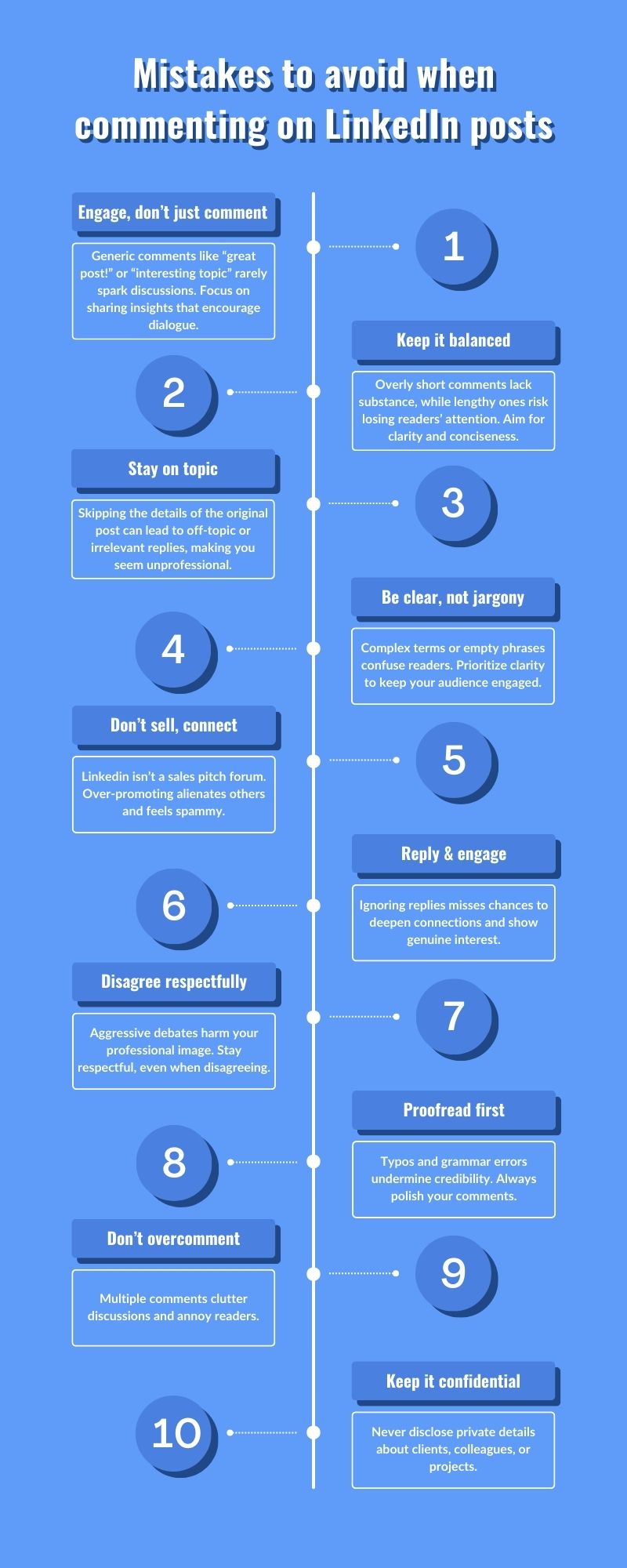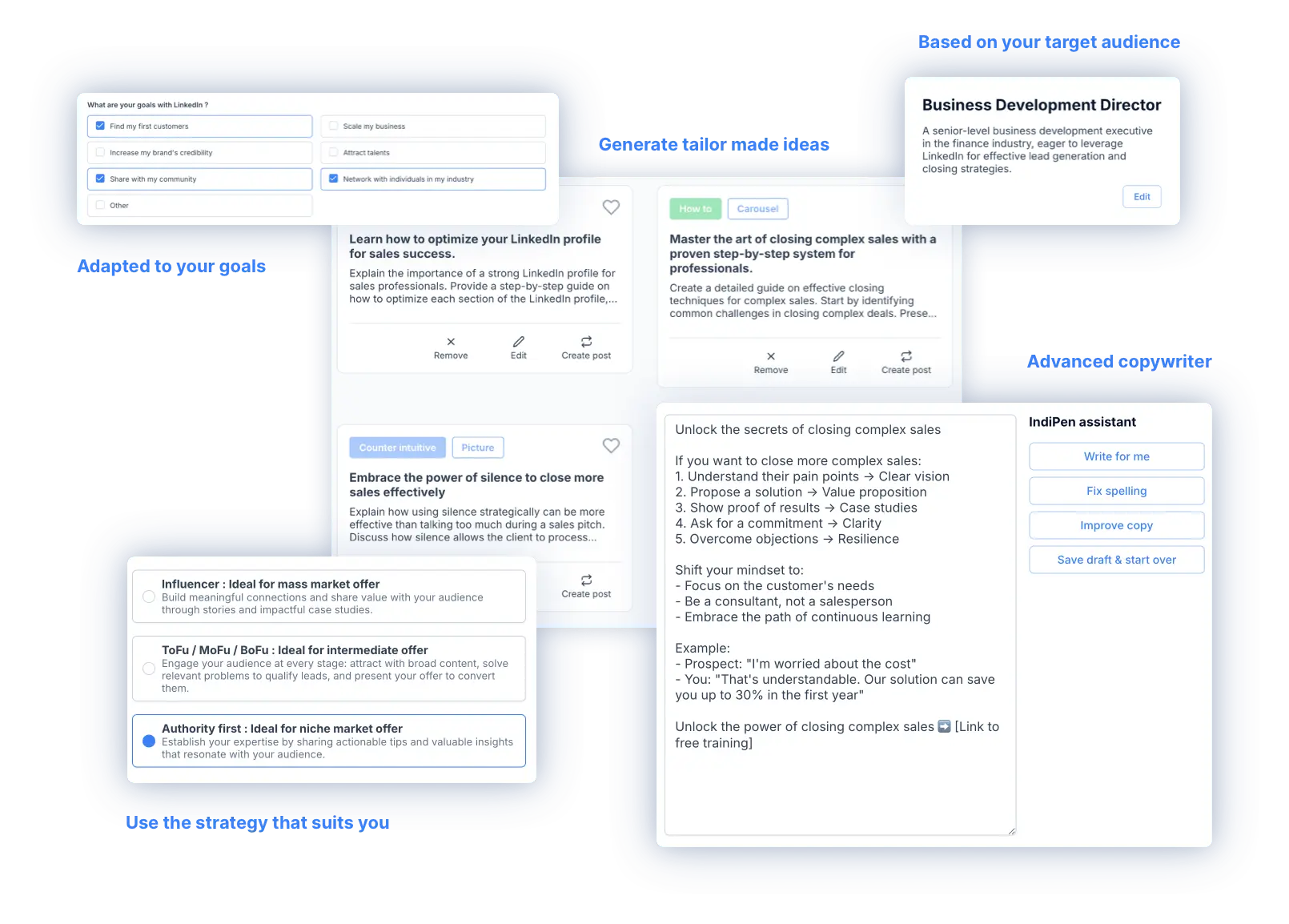Mistakes to avoid when commenting on LinkedIn posts
LinkedIn is a jungle. With millions of posts every day, your comments are your weapon to stand out or get lost in the crowd.
But here’s the truth: 90% of comments make no impact. Why? Because most professionals fall into the same traps.
In this article, I’ll show you:
➔ Why generic comments kill your credibility (and what to do instead).
➔ The 10 most common mistakes you absolutely must avoid.
➔ How to turn every comment into a networking opportunity.
1. The 10 mistakes to avoid (and how to fix them)
Mistake #1: Not adding value
Generic comments like “Very interesting” bring nothing.
Solution: Share an experience, ask a question, or offer a unique perspective.
Example:
“I’ve tried this method with my team. Do you have any tips for adapting it to an international context?”
Additional resource: The article “The Powerful LinkedIn Commenting Strategy That Wins You More Followers” discusses the importance of the most relevant comment under a LinkedIn post
Mistake #2: Writing comments that are too long or too short
Too short = no substance. Too long = you lose your audience.
Solution: Find a balance. 2 to 4 well-targeted sentences is ideal.
Example:
“Your strategy is inspiring. We’ve seen similar results using [tool]. Have you tested it in [specific context]?”
Additional resource: The article “How the LinkedIn Algorithm Works [Updated for 2025] | Sprout Social” discusses the importance of conciseness and relevance in LinkedIn interactions.
Mistake #3: Ignoring the context of the post
Commenting without understanding the post is the best way to look off-topic. (Yes, many people do this 😅)
Solution: Read the post and comments carefully before responding.
Example:
If the post is about leadership, don’t veer into productivity tools.
Mistake #4: Using vague terms or jargon
Vague or overly technical phrases discourage readers.
Solution: Be clear and precise. Avoid jargon unless you’re sure your audience understands it.
Example:
Instead of “This use case has an impressive ROI,” say:
“This strategy increased our ROI by 30% by optimizing workflows.”
Mistake #5: Promoting your services too aggressively
LinkedIn isn’t a sales platform. Overly commercial comments push people away.
Solution: Mention your work only when relevant, and subtly.
Example:
Instead of “Our tool solves this,” say:
“Tools like [sector example] can help. We’ve seen results with similar approaches.”
Mistake #6: Not responding to other comments
Ignoring replies is missing an opportunity to nurture the conversation.
Solution: Be responsive. Answer questions and deepen the discussion.
Example:
“Thanks for your question! Here’s how we approached it…”
Additional resource: The article “3 mistakes to absolutely avoid on your LinkedIn posts” emphasizes the importance of responding to comments to maintain engagement.
Mistake #7: Being too negative or confrontational
Aggressive debates harm your professional image.
Solution: Express disagreement respectfully. Focus on ideas, not personal criticism.
Example:
Instead of “That won’t work,” say:
“Have you considered [alternative]? It could solve [specific challenge].”
Mistake #8: Forgetting to proofread your comment
Typos and grammar mistakes give an unprofessional impression.
Solution: Always proofread your comment before posting. Use tools like Grammarly if needed.
Example:
Fix errors like “I agree with your point” to “I agree with your point.”
Mistake #9: Commenting too often on the same post
Posting multiple comments on the same post can come across as spam.
Solution: Limit the number of comments. Consolidate your ideas into a single thoughtful response.
Example:
Instead of posting 3 separate comments, combine your ideas:
“In addition to the previous points, I’d add [X] and [Y].”
Mistake #10: Ignoring privacy rules
Never disclose confidential or sensitive information in your comments.
Solution: Always respect confidentiality. If referring to past projects, anonymize the details.
Example:
Instead of saying “Client X had issues with Y,” say:
“Some teams find Y difficult. Here’s how we helped them.”

2. How to turn your comments into connections
Every comment is a networking opportunity. Here’s how to make the most of it:
1️⃣ Respond to replies: If someone engages with your comment, continue the conversation.
2️⃣ Highlight the author: Tag them if your comment adds value to their post.
3️⃣ Follow up: If the discussion is interesting, send a connection request with a personalized message.
Example of follow-up message:
“Hi [Name], I really enjoyed our discussion on [topic]. Let’s stay connected!”
3. The ultimate checklist for commenting on LinkedIn
Before hitting “Post,” ask yourself:
- Does it add value?
- Is it specific to the post?
- Is it clear and concise?
- Does it encourage conversation?
Conclusion: Stop commenting into the void 😅
LinkedIn isn’t about shouting louder. It’s about speaking smarter.
By avoiding these 10 mistakes and following these tips, you’ll:
✅ Gain credibility.
✅ Spark enriching conversations.
✅ Turn your comments into connections and your connections into opportunities.
Choose several posts. Apply these strategies. And watch your engagement soar.
To go further:
If you want to dive deeper into your LinkedIn comment strategy, here are some resources that might interest you:
🔹 6 Reasons to comment on LinkedIn posts to attract prospects
🔹 10 approaches for LinkedIn comments that turn engagement into leads
Implement these techniques and watch how your comments can turn into a great prospect-generating machine 🙂
Ready to turn your LinkedIn profile into a Lead Machine ?
IndiPen helps you define your strategy, find content idea and write engaging content to generate leads with ease
Book a demo
